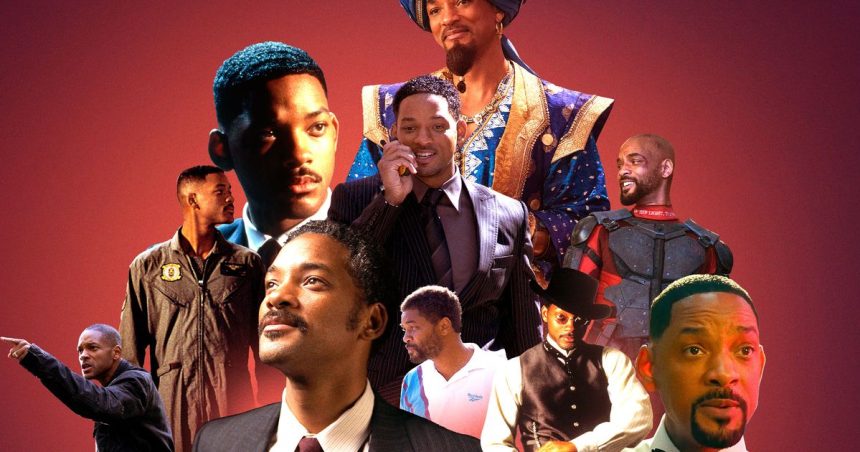Photo-Illustration: Vulture; Photos: Everett Collection (Daniel Smith/Walt Disney Studios, Clay Enos/Warner Bros., Columbia Pictures, 20th Century-Fox, Warner Bros.)
This article was originally published on September 25, 2018. It has been updated to include Smith’s recent films, including Bad Boys: Ride or Die.
Will we ever stop talking about the Slap? Will Smith has been one of the biggest movie stars on the planet for more than two decades now — the very definition of an American success story in just about every possible way — and yet, one night in March, at an awards ceremony that should have been the culmination of his incredible career, everything changed. Smith went from the man everyone couldn’t wait to cheer for winning his first Oscar to a man banned from the event for the next decade.
Whether or not all that is fair or unfair will remain a hotly contested debate — it feels like we’ll be yelling at each other about the Slap for decades — but it has unquestionably blurred public perception of just how varied, ambitious and fascinating Smith’s many performances have been. But you shouldn’t deny the scope of Smith’s career. From youthful rap to The Fresh Prince of Bel-Air to Independence Day to global domination, Smith was on you so fast you barely had time to register that he’d taken over the world. And, at least until the Slap, he remained likable and relatable, even when his star has taken a dip or two. He even managed to still be charming in Suicide Squad, which one would have thought impossible.
And don’t think he doesn’t have depth, either, playing “serious” roles in both dramas (Ali) and four-quadrant blockbusters (I Am Legend). Even with his missteps, Smith remains the sort of movie star you just don’t see anymore. With the release of Bad Boys: Ride or Die, we went back and ranked all of his movie performances.
The debacle that prompted Smith to take an 18-month hiatus from acting, After Earth really is as bad as you remember: an overly ponderous, drag-ass sci-fi action-drama in which Will’s son Jaden wholly lacks the charisma that made his dad a mega-star. What undoubtedly made its failure harder on Smith was that he had dreamed up the original story and thrust his son into the central role, figuring it would propel him up the Hollywood food chain. Maybe that’s why Smith looks so glum throughout the film: He seems to be realizing in real time what a bad idea After Earth was.
Yeah, it’s the complete misguided mess that you’ve heard it is, but all told, it’s more embarrassing for Edward Norton, Michael Pena, and Kate Winslet — who play the awful human beings meant to be the “good guys” of this bewildering “heartwarmer” — than it is for Smith, who is mostly put-upon and thus escapes the true awfulness. The real problem with Smith here is one that’s common to many of his “serious” performances: He turns down the star wattage that we love about Will Smith and turns mopey and morose. There are already enough mopey and morose actors: There’s no need for you to be one, Will. Though to be fair: It’s possible he realized the dog of a movie he was in and just couldn’t work up any smiles anyway.
Everything that was terrific about the first Men in Black — the witty premise, the hip tone, the oil-and-vinegar rapport between Smith and Tommy Lee Jones — evaporates in this strained, unfunny sequel. Where Smith’s Agent J was once an awesome smartass, Men in Black II presents him as just a smug dick. This is the first time Smith seemed to take a movie precisely because he needed a hit — which, in the wake of Wild Wild West, was the case.
The infamous Jellyfish movie. This is the closest Smith ever came to John Travolta’s Battlefield Earth territory, a personal project that’s a nightmare to sit through and seriously made you wonder for a second if Smith had some sort of Jesus complex. And seriously: Watch that jellyfish scene:
This really did make sense at the time. Barry Sonnenfeld of the Men in Black films, Kevin Kline as the trusty sidekick, and a sci-fi-meets-Western premise. But, wow, did it ever go wrong. (Starting with that terrible theme song. We bet Smith would like that one back.) Pandering, chaotic, disorganized Hollywood filmmaking at its worst. The one true big-budget flop of Smith’s career, and you can’t say it doesn’t earn the designation.
The infamous Netflix fiasco — and by “fiasco” we mean “millions of people vaguely paid attention to it while folding laundry” — is pretty terrible, maybe even worse than Ayer’s much-derided Suicide Squad. But the worst part is how checked out Smith is here. The one thing you can usually count on is Smith giving it his all, even in lousy material. Here, he looks like he’s perpetually glancing off-screen to see if his Netflix check has cashed. The duo are a deadly mix: This is a near-nadir for him.
What’s it like when a seemingly random smattering of early ‘90s up-and-coming young “stars” all don’t take a bath for a day and pretend to be “troubled” drug addicts on the streets of Los Angeles? Well, it looks like a movie-of-the-week with everybody wearing flannel. Seriously, check out this crazy cast: Dermot Mulroney, Sean Astin, Lara Flynn Boyle, Christian Slater, David Arquette, Nancy McKeon, Alyssa Milano, Ricki Lake! Smith, in his first film, plays Manny, a legless homeless kid who mostly shows up to be friendly, move a wheelchair quickly, and get beaten up. Fortunately, Smith would be out of these roles very soon.
Smith has just a small part in this Akiva Goldman misfire, but it’s a super silly one: He plays the devil! He doesn’t do a lot of devilish things, but he does do this:
We had kinda forgotten he was in this, too. Or, maybe we just wanted to forget: Smith is part of the epic, lame battle royale that happens near the end of this just-good-enough sequel. He’s the anchor of the ESPN crew, and his cameo consists mostly of a goofy early-’80s hairdo. And what’s with his voice? Is he trying to make his character sound prissy or nerdy or what? Don’t feel too bad, Will: Everybody in this scene — Tina Fey, Kanye West, Jim Carrey — comes off badly.
A classic “Magical Negro” role that Smith was able to avoid the rest of his career, this is a low point for both Smith and director Robert Redford. The role is beneath Will Smith, and really beneath any prominent black actor; it’s impossible to imagine it being made today. Seriously, watch this again: You’ll be pretty taken aback. (It was also the last film of Jack Lemmon.)
Well, you certainly can’t blame Smith for everything that goes wrong with Suicide Squad, and at the very least, he’s a reason to keep watching when the movie is flapping all over the place and running into walls. He and Robbie are the only people who seem to have put much thought into what went onscreen, and for that, we must express our gratefulness. And then run out of the theater.
Because Bad Boys for Life was commercially successful — and, perhaps more importantly, because Will Smith desperately needs hits in the post-Slap era — the world was gifted with a fourth installment of a series that started nearly 30 years ago. We’re placing this one right behind the previous chapter because Smith’s performance is slightly less compelling than it was in Bad Boys for Life. This movie requires him to do some heavy emoting — his angry long-lost son, the lethal criminal Armando (Jacob Scipio), who was introduced in the previous film, goes on the run with Dad, allowing them a chance to repair their fractured bond — but Ride or Die is so halfhearted that you never quite care about what’s supposed to be this sequel’s emotional centerpiece. Put it this way: If Smith’s career was going great, he wouldn’t have made this movie, and you can sense it on his resigned face.
This entirely unnecessary sequel is basically a cleaned-up, duller version of either of the first two movies. There’s nothing offensive in it, nothing Smith will cringe when he watches in 20 years, but nothing particularly interesting either. For all of Michael Bay’s Michael Bay–ness, he at least keeps his movies moving and kinetic. Directors Adil and Bilall, while dutiful and energetic, can inspire no such energy from either of their leading men. It’s funny that people talked about this movie happening for 20 years and then immediately forgot about it when it happened — despite it making a ton of money right before the pandemic wiped out movie theaters for months.
Smith didn’t have to do this sequel — he was already the biggest movie star on the planet at this point — and he probably should have stayed away. This is Michael Bay trying maybe a little too much comedy, to the point that the opening sequence takes place at a Klan rally in which Martin Lawrence gets shot in the butt. It goes downhill from there, but Smith somehow keeps it afloat, largely because he’s Will Smith and has an internal governor that won’t let him sink too low.
Yes, Will Smith was in a Kevin Smith movie. Only briefly, though. This brief, and ill-fated, attempt by Kevin Smith to become a Serious Hollywood Filmmaker fell on its face — to be fair, it would have difficult for anything to survive Bennifer — but it’s worth pointing out that Smith has a wonderful little cameo here. Playing himself, he comes across Ben Affleck’s character in a hospital waiting room and provides the film its only genuine moment, in which he and Affleck share a moment of understanding and commiseration that feels earned. It’s also funny how Smith plays himself. Unlike most movie stars, who feel the need to send up their persona, Smith is just how he sees himself, and maybe how he actually is: A laid-back guy who’s living the best life and can’t believe how lucky he is. Few movie stars have felt so comfortable in their own skin. You see that surprisingly well here.
After the initial Aladdin trailer, which revealed Will Smith as the Big Blue Dude, received less-than-stellar responses from the internet, it was reasonable to go into this live-action remake with major worries. Lowered expectations are probably for the best: The new movie isn’t terrible, although it’s certainly a far cry from the original. Ditto Smith as the jovial genie. Weirdly, for all the hits he’s been a part of over the decades, he’s rarely done what you’d call a straight-up family film, outside of maybe Shark Tale, so it’s interesting to see him tap into his big-kid gusto in such a pronounced way. Still, anyone attempting to outdo Robin Williams is asking for trouble, so it’s just as well that Smith doesn’t try, mostly playing the character as the Fresh Prince of Bel-Air all grown up. Too much of this Aladdin seems designed chiefly to make money, and likewise Smith’s performance is profoundly efficient — it’s a somewhat impressive technical and creative feat that no one really needed.
Smith is extremely fun as a con man — the first con man he’d played since Six Degrees of Separation 20 years earlier, a movie that strikes a very different pitch — in a movie that never quite figures out whether it’s a heist comedy, a dark thriller, or something. He has obvious rapport with Margot Robbie, which would carry over to a worse movie in Suicide Squad, and, as usual, he effortlessly gets the audience on his side. The story has too many twists and turns to be taken seriously, but it’s worth it just to hang out.
Smith’s best straight-drama performance since 2006’s The Pursuit of Happyness finds him playing Bennet Omalu, a soft-spoken Nigerian doctor living in Pittsburgh who helped uncover the traumatic brain injuries devastating NFL players. It’s a modest portrayal without much in the way of actorly fireworks, and the two-time Oscar nominee leans heavily on his quiet decency. When you’re among the most charismatic humans on the planet, that’s more than enough.
The concept of this movie is so inherently bizarre — Whoopi Goldberg discovers that the father of the child she conceived from a sperm donor is dumbass car salesman Ted Danson — that you look for any sort of escape. And you certainly find it in Smith, who plays the love interest of the daughter (Nia Long) with such movie-star charm that he practically leaps off the screen. He wouldn’t have to play silly comic-relief supporting roles much longer, but, man, was he ever good at it. He’s so exuberant and having such a blast that it almost makes you forget Goldberg’s and Danson’s real-life relationship. Almost.
The sort of dumb studio rom-com that goes as far as its star will take it, Hitch suggests what Smith’s career might have been like if he’d taken the Matthew McConaughey route. He plays a suave relationship adviser who counsels dorky Kevin James on how to talk to a pretty gal (Amber Valletta) — so, of course, he’s nervous in his own life trying to woo assertive gossip columnist Eva Mendes! Yeah, like we said, Hitch is dumb, but it’s dumb in a fluffy, appealing way, and Smith gets to work that 1,000-watt smile while playing the romantic lead — something he hasn’t done much at the movies.
Smith and director Michael Bay teamed up when both men were on a career upswing, and Bad Boys was the very appealing (and, yes, sorta racist and homophobic) result. This is where the Fresh Prince graduates to big-screen badass action hero, setting the stage for Independence Day, Men in Black and the title of King of the Fourth of July Blockbuster. What’s funny about watching Bad Boys now: Dude seems so young, but his smartass chemistry with Martin Lawrence still shines.
Will Smith is up for the challenge of battling (and of course eventually teaming up) with his 30-years-younger clone, but even he can’t overcome this hoary, aging-hit-man story that’s so tired that it’s a borderline miracle he doesn’t once say “I’m too old for this shit.” (And don’t get us started on Ang Lee’s insistence on the accelerated FPS rate, which makes the whole thing look like the most expensive episode of As the World Turns ever.) Fortunately, Smith is still dedicated enough to sell the dynamic between his two selves, and there are even some moving moments in which you see him struggling to reckon with his younger self, both onscreen and off. But if you’re going to re-create a young Will Smith … don’t you have to make him more fun than this?
This was the first movie Smith made after 2008’s Hancock and Seven Pounds, and the four years away from multiplexes only reminded us how much we loved the guy. Men in Black 3 washes away the bad memories of the 2002 sequel, pairing Smith mostly with Josh Brolin, who’s playing Tommy Lee Jones’s Agent K in the past. The time-jumping narrative and Brolin’s spot-on Jones impression are the movie’s highlights, which allows Smith to ease back into movie-star mode, supplying Agent J with endless cool and still-stellar comic timing.
A fairly basic thriller that hasn’t aged particularly well — unlike the Isaac Asimov book it’s based on — and feels compromised, not least of which by some truly bizarre product placement. Smith can play this sort of Wry Cop in his sleep, but he’s a steadying force among all the chaos around him. He’s also a surprisingly urgent action star: He’s physical, sure, but also vulnerable and insistent. He makes it look easier than it is.
This Tony Scott action-thriller came out during Smith’s bulletproof period where he could do no wrong. (Spoiler alert: The following year’s Wild Wild West would end that streak.) He’s not the cool cat or the cocky showboat this time, though: He plays a mild-mannered lawyer mixed up in a government conspiracy, with only Gene Hackman’s mysterious operative able to save him. Enemy of the State was Smith’s dry run for the dramatic roles he would soon be pursuing, and he’s commanding and sympathetic as a regular guy fighting for his life.
Smith’s nerviest blockbuster finds him playing a superhero who’s also an asshole, and the actor seems tickled at the prospect of tweaking his own squeaky-clean image. Hancock doesn’t always balance its desire to be a dark satire of comic-book movies with its need to deliver supersized, put-asses-in-the-seats spectacle. But Smith finds the nuance and pain in an all-powerful character who can save the world but can’t get out of his own way.
Smith’s first post-Slap movie was almost not released, and it does seem a little buried on Apple TV. While director Antoine Fuqua’s approach to the heady material is a little more action-movie glib than you might like (does a movie about an escaping slave really need a scene where he fights an alligator?), Smith makes up for it with an oft-wordless performance in which his pure physicality and presence carries the entire movie. This is his Revenant, but Smith is less showy than DiCaprio; he simply invests this man with gravity, and a spine of cement, that is all the weight the film needs.
One of the hardest things for A-list stars to do is portray “ordinary” people. (Stay too long in the limelight and you lose the common touch.) But Smith earned his second Best Actor nomination effortlessly playing Chris Gardner, who in the early 1980s fell into homelessness while raising his young son (Smith’s own son Jaden). There’s nothing showy in Smith’s performance, which is crucial for a character who’s been beaten down by life but still clings to a defiant optimism. Smith’s obvious affection for his boy radiates through the screen.
This adaptation of John Guare’s Pulitzer Prize–winning play had all the Appeal to the Smart Upper East Side Crowd cachet a young actor looking to make a splash would want, but what’s stunning is how much fire and passion Smith brings to the performance, at times wiping seasoned vets Donald Sutherland and Stockard Channing right off the screen. Smith is a little mannered at first as a grifter who cons a cultured NYC couple into believing he’s Sidney Poitier’s son, but once his ruse is discovered, he, and the film, turn into something much more raw and searing. Even if you found Smith charming before this, his performance snapped you to attention: Wait, he can do this? In some ways, he hasn’t quite challenged himself as much since.
This sequel didn’t bring back Smith, and it left a huge crater at its center: Would we have ever made this such a big hit, would we have ever cared so much, if it hadn’t have been for Smith? The movie is fairly standard disaster-flick porn — albeit done in Roland Emmerich’s harmlessly dumb style — but Smith springs it to life every time he shows up. No wonder he became such a July 4 star: This is America how we want to see ourselves, a little John Wayne, a little Muhammad Ali. Welcome to Earth!
The movie never quite figures out its ending — and the initial ending, from the book but rejected by test audiences, might have been a better place to land — but Smith is incredibly moving as a man who has lost everyone he loved and knew but still, in spite of himself, keeps trudging forward. It’s a tricky performance, and its strength is in Smith’s unwillingness to ever go for the easy out: You can tell he’s invested in what a man like this would go through, and he appears legitimately damaged from it. Not everything in this movie works, but it might be Smith’s most underappreciated performance.
Muhammad Ali’s death may have brought newfound appreciation to this deeply moving, under-loved biopic, but the greatness of Smith’s performance was never in dispute. Ali merges the two sides of this dynamic actor — the electric entertainer and the soulful dramatist — into one perfect whole, presenting the iconic boxer as the ultimate showman who was also sensitive to (and swept up in) the political and racial turmoil swirling around him. Earning his first Oscar nomination, Smith uses his charisma like a weapon, tapping into Ali’s sting-like-a-bee magnetism.
Sure, the man is a superb dramatic performer. But be honest: This is the movie — and character — you first think of when someone mentions Will Smith. Men in Black is a miracle of a blockbuster — a snazzy, funny, eye-popping sci-fi action movie — and Smith treats the whole enterprise like one big lark. No movie star makes blasé irreverence feel hipper, just as no other movie star makes event movies feel like the coolest thing in the world. You know what? He did make this look good.
Richard Williams is, in every possible way, unreasonable. He’s stubborn, incorrigible, obnoxious, and so certain of his own virtue and judgment that everyone who deals with him ends up wanting to pull their hair out. (Someone’s going to make a great supercut of this film featuring only people’s exasperated reactions to him.) The thing is, though, somehow he turns out to be right about everything. This authorized but hardly hagiographic biopic of Williams, who famously told the world that his two little daughters would grow up to be the best tennis players in the world, and then they were, is a stirring, uplifting sports movie, sure — it will definitely make your kids want to go outside and play some tennis — but it’s also an incredible showcase for Smith, who plays Williams as an unmovable object: The parent as impenetrable fortress, an advocate for his kids often in the face of any good sense. Smith’s Williams is a force of nature — charming, narcissistic, prideful, wounded, fiercely protective, and gloriously impossible. And again, he turns out to be right about everything. Smith clearly feels a kinship with this man, and it results in the best performance of his career.
Grierson & Leitch write about the movies regularly for the New Republic and host a podcast on film. Follow them on Twitter @griersonleitch or visit their site griersonleitch.com.












